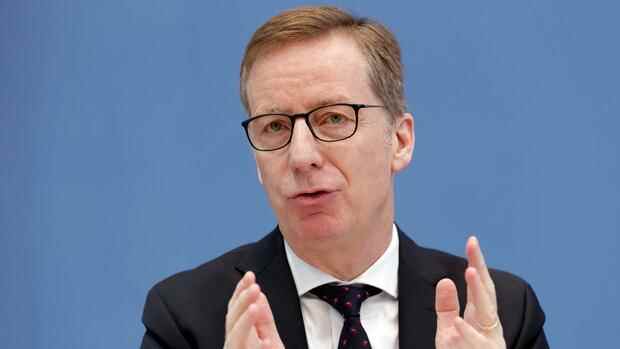According to the IW boss, a gas embargo against Russia would have serious consequences.
(Photo: imago images/Jürgen Heinrich)
Dusseldorf Mr Hüther, a survey by the Handelsblatt shows that wages in various areas will rise sharply this year. Is the dreaded wage-price spiral coming?
A wage-price spiral arises when wages are increased across the board without regard to productivity. In any case, this cannot yet be deduced from the collective bargaining. Due to the shortage of skilled workers, wages will increase in the medium term, but not across the board.
In which areas is the labor shortage particularly great?
Meanwhile, not only in the scientific and mathematical field (MINT) and social services, the pandemic has also shown the openness of the labor market to less qualified people.
Inflation rates are rising drastically, while at the same time growth prospects are deteriorating as a result of the war. Is stagflation imminent?
In the medium term, the risk from the war has increased significantly as energy prices will remain higher on a sustained basis. Added to this is the CO2 price increase and the structural change towards climate neutrality being overwhelmed. In addition, demographic change will weaken growth. So: inflation rates well above the ECB’s inflation target of two percent and weak growth – a stagflationary scenario is realistic until the end of the decade.
Does the ECB now have to take countermeasures quickly, like the US Federal Reserve?
So far, inflationary effects on the supply side have dominated, and the ECB cannot do anything about them. At the same time, the central bank must be vigilant because it is already evident that this is being passed on to other areas. In addition, the rapid turnaround in monetary policy by the US Federal Reserve is strengthening the dollar and causing higher import prices in Europe. If the gas embargo comes with all its consequences for the German – and also the European – economy as a whole, the ECB should approach the normalization of its monetary policy cautiously. I expect smaller rate hikes in the second half of the year once the economy as a whole normalizes.
Top jobs of the day
Find the best jobs now and
be notified by email.
The federal government is resisting this gas boycott. Do you think this is correct?
I consider the macroeconomic damage of a gas embargo in Germany to be very serious; It’s about the question of whether we will or want to have basic material production in Germany. In doing so, we are damaging the core of the German business model in a way that Putin could only wish for. Because the cascade effects, especially via the basic chemistry, are likely to be significant; Unemployment in the millions is to be expected. An import, if it is at all possible in a comparable way, would drive us into other dependencies, above all from China. We must remain capable of acting, which is why we will be dependent on Russian gas for at least another two years.
What do you think of the federal government’s assertion that an immediate boycott of energy imports would not help because Putin could not use these funds for his war?
This can be answered from different perspectives: Since Putin obviously has no empathy for human suffering and is claiming a historical mandate for himself, sanctions will not prevent him from going to war. He acts ice-coldly calculating by urging the West to introduce sanctions through massacres of the civilian population, which in the short term harm the West more than it does itself.
The real question was whether the proceeds from the raw materials would finance Putin’s war…
Economically, this is a bit more confusing. He covers the running costs of the war (pay, equipment) in rubles, and there is no sign of direct use of the foreign currency. With regard to the overall economic development, foreign exchange naturally has a protective effect because it creates import options. On the other hand, the trade sanctions and the sanctions against the financial sector work. The isolation of the central bank is significant, as demonstrated by Putin’s attempt to accept only rubles for exports.
What do you think of the surprisingly emotional debate culture among economists in Germany?
Two developments are mixed up: on the one hand, we are all emotionally affected and mentally challenged to deal with the horrors of war in Europe that were previously considered unimaginable. It is undoubtedly a great challenge to argue soberly and deliberately. Out of the urge to want to do something, the standards shift, value judgments over form the model analysis more than usual. On the other hand, there has been a trend in economics for some time to evaluate certain methods as exclusively scientific. It is true that the model analysis has brought us further, but cannot replace anything else. So it’s always about a constructive discourse on different methodological strands, but some have set a very robust tone against this for some time.
More: The consequences of an energy boycott for German industry – and for Russia
